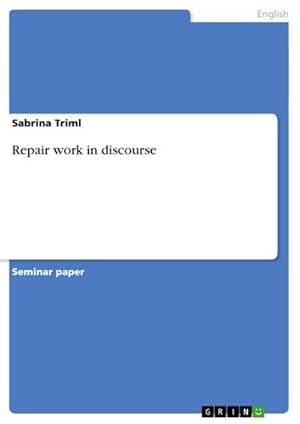Repair work in discourse von Sabrina Triml (1 Ergebnisse)
Produktart
- Alle Produktarten
- Bücher (1)
- Magazine & Zeitschriften
- Comics
- Noten
- Kunst, Grafik & Poster
- Fotografien
- Karten
-
Manuskripte &
Papierantiquitäten
Zustand
- Alle
- Neu
- Antiquarisch/Gebraucht
Einband
- alle Einbände
- Hardcover
- Softcover
Weitere Eigenschaften
- Erstausgabe
- Signiert
- Schutzumschlag
- Angebotsfoto
Land des Verkäufers
Verkäuferbewertung
-
Repair work in discourse
Verlag: GRIN Verlag, 2008
ISBN 10: 3638905500ISBN 13: 9783638905503
Anbieter: AHA-BUCH GmbH, Einbeck, Deutschland
Buch
Taschenbuch. Zustand: Neu. Druck auf Anfrage Neuware - Printed after ordering - Seminar paper from the year 2000 in the subject English Language and Literature Studies - Linguistics, grade: 2,0, University of Vienna (Anglistik und Amerikanistik), course: Linguistisches Proseminar, language: English, abstract: Spoken discourse is a process depending on the interaction of at least two participants. They mutually construct this process and understanding is achieved by interaction. But communication is always in danger of breaking down. When people talk to each other they constantly try to avoid this breakdown by preventing misunderstandings. In writing one can carefully think about the 'right' words, reconstruct, correct and rewrite sentences or sections as often as necessary. In spoken discourse this reconstruction has to happen immediately.Sentences or ideas are not always 'brought to an end'. In order to keep discourse smooth, fluent and comprehensible participants need to repair utterances of themselves or others during speaking. It is often the case that someone notices during saying one utterance that they actually want to say something else. So they possibly stop within one sentence and bring in another idea. Thus, repair means interruption and correction of oneself or another person like: that will be forty - no fifty - dollars. In written discourse such an insertion is often indicated by means of hyphens. Likewise, clarification can happen more explicitly after questions who signal that the receiver did not understand something and/or asks for further information or a repetition of what was said before. This is often needed when discourse takes place between participants with a different status of knowledge about the topic of their conversation. All these techniques aim to produce or maintain a process of mutual understanding and keep the conversation going on.When and how people use repair work depends on extra-linguistic factors like the topic of the conversation, the kind of discourse and where it takes place, the relationship of the participants, their age and knowledge of the used language. The aim of this paper is to point out that speakers tend to use a higher amount of repair work in informal than in formal discourse. This will be done by analysis of different dialogues within different settings. The hypothesis is that in less formal discourse in an entertaining television programme more clarifying utterances are used than in formal interviews on serious news channels. It is supposed that formal discourse types follow some underlying structures whereas informal ones are unstructured and therefore repairs are more likely to happen.


